
Lithuania steps up defence as ex-CIA chief cites Russian threat
“If Ukraine falls, Lithuania is next. That’s not speculative. It’s consistent with everything Putin has said and done,” Petraeus said.

“If Ukraine falls, Lithuania is next. That’s not speculative. It’s consistent with everything Putin has said and done,” Petraeus said.

While Romania, Bulgaria and Serbia continue to attract foreign capital, structural delays in electrification and infrastructure risk diminishing long-term value, according to the International Trade Centre (ITC) Trade Map.

The result will extend Law and Justice (PiS) party influence over the presidency and its continued obstruction of the "big tent" pro-EU governing Civic Coalition (KO) led by Polish Prime Minister Donald Tusk.

China's trade with Central and Eastern Europe (CEE) reached USD 142.3bn in 2024, marking a 6.3% year-on-year increase, surpassing China's overall foreign trade growth rate by 2.5 percentage points, according to China's General Administration of Customs. The total marked a 4.

Nominal minimum wages in Romania and Bulgaria have more than doubled in the last decade, with the sharpest growth before 2020. Czechia and Slovakia now apply EU-aligned benchmarks for annual adjustments.

Rail Baltica has faced repeated delays, cost inflation and uneven progress across national segments.

Hungary and Slovakia have emerged as the most vocal opponents of two of the EU’s most consequential reform proposals: plans to phase out Russian energy imports and to overhaul the bloc’s long-term budget to prioritise defence, climate and digital transition. EU mulls ban of new Russian energy contracts

Centrist Warsaw Mayor Rafal Trzaskowski narrowly won in the first round of Poland’s presidential election, setting up a closely contested runoff on 1 June. With 99.75% of votes counted, Trzaskowski, backed by Polish Prime Minister Donald Tusk’s centrist Civic Coalition (KO) secured 31.3% on 18 May

Hungarian Prime Minister Viktor Orban's ruling Fidesz party submitted on Tuesday, 13 May a bill that would allow the government to monitor, penalise and potentially ban organisations receiving foreign funding and categorised as threats to national sovereignty. The draft law would expand the powers of the Sovereignty Protection

Independent pro-EU candidate Nicusor Dan won Romania’s presidential election on Sunday, 18 May, defeating far-right challenger George Simion in a runoff vote. The result represents a holding of the political centre after months of polarised campaigning, easing tensions in Brussels and Central and Eastern Europe (CEE). Dan secured 53.

Chinese electric vehicle (EV) manufacturer BYD on 15 May signed an agreement with the Hungarian government to relocate its European headquarters to Budapest's 11th District, alongside two major research and development projects. The announcement marks the latest phase in BYD's European expansion. Hungary's government

Bulgaria’s pro-European opposition has tabled a declaration committing the country to join the Eurozone on 1 January 2026, challenging the government to reaffirm its commitment to its deadline, amid suggestions of a referendum on the issue. The We Continue the Change-Democratic Bulgaria (PP-DB) coalition, called for Parliament to restate

In a new step in the cleaner transport transition, OMV Petrom has inaugurated Romania's largest electric vehicle (EV) hub with 34 charging points of up to 400kW on the A1 motorway near Miercurea Sibiului, central Romania. The site is located on the Rhine-Danube Corridor - one of Romania’

The Security Service of Ukraine (SBU) has arrested two Ukrainian military veterans in Zakarpattia, west Ukraine, on suspicion of high treason, it announced on Friday, 9 May. Ukrainian authorities claim Hungary was collecting sensitive military data with an eye on a possible future incursion into western Ukraine. The SBU said

Albanian Prime Minister Edi Rama has claimed victory in Albania’s parliamentary election on Sunday, 11 May, after exit polls showed his Socialist Party (PS) with a clear lead. The vote, which has been characterised as ballot on Albania’s commitment to EU accession, was marked by low turnout and